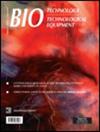通过临床质谱平台提升精准医疗
IF 1.4
4区 生物学
Q4 BIOTECHNOLOGY & APPLIED MICROBIOLOGY
引用次数: 0
摘要
摘要当今医学上出现了大量的新技术。基于基因组分析、质谱和细胞分选平台的复杂诊断正在推动技术转让,并促进个性化患者管理进入临床实践。质谱(MS)可以被视为促进精准医学(PM)发展的主要工具之一,该医学利用患者的基因型和表型调查来建立个性化的药物治疗。虽然基因检测允许医生选择合适的药物,但MS检测提供了患者的实际表型,以及所有的环境、药理学和病理学变量。因此,MS是个性化患者管理的重要技术,高分辨率MS系统用于解决具有挑战性的分析需求。MS的巨大技术进步导致引入了具有前所未有的识别能力、极高的灵敏度、特异性和扩展的线性范围的方法,这些方法在医学实验室中更容易使用,并且基于当前的参考分析原理。此外,通过在单个样本中同时测量生物活性化合物、其前体和代谢物来进行面板分析的能力,极大地提高了结果的信息价值,最终改善了患者护理。典型的例子包括新生儿筛查、治疗药物管理、毒理学、内分泌学、微生物学、临床组学分析等。需要特别强调的是,临床多发性硬化综合了化学和解剖病理学:尽管仍处于研究阶段,但多发性痴呆成像和iKnife多发性病变手术指导为个性化治疗和个性化患者护理开辟了新的视野。本文章由计算机程序翻译,如有差异,请以英文原文为准。
Enhancing precision medicine through clinical mass spectrometry platform
Abstract There is an extraordinary flood of new technologies in medicine nowadays. Sophisticated diagnostics based on genome assays, mass spectrometry and cell sorting platforms are driving the technological transfer and promote the entrance of individualized patient management in clinical practice. Mass spectrometry (MS) could be viewed as one of the major tools that promote the development of precision medicine (PM), which employs a patient’s genotype and phenotype investigation to establish individually tailored drug treatment. While genetic testing allows the physician to choose appropriate medicine, MS assays provide the patient’s actual phenotype, with all of the environmental, pharmacological and pathological variables. Therefore, MS is an essential technology for personalized patient management, and high-resolution MS systems are employed to resolve challenging analytical demands. The great technological advance of MS resulted in the introduction of methods with unprecedented identification power, extreme sensitivity, specificity and extended linearity range, which are simpler to use in the medical laboratories, and are based on the current reference analytical principles. Further, the ability to perform panel profiling with simultaneous measurement of bioactive compounds, their precursors and metabolites in a single sample, enormously amplifies the informative value of results, with ultimate improvement of patient care. Typical examples include newborn screening, therapeutic drug management, toxicology, endocrinology, microbiology, clinical omics assays and others. It should be specially emphasized that clinical MS integrates chemical and anatomical pathology: MS imaging and iKnife-MS guidance in surgery, although still in the research phase, open new horizons for personalized treatment and individualized patient care.
求助全文
通过发布文献求助,成功后即可免费获取论文全文。
去求助
来源期刊

Biotechnology & Biotechnological Equipment
工程技术-生物工程与应用微生物
CiteScore
3.10
自引率
0.00%
发文量
90
审稿时长
1 months
期刊介绍:
Biotechnology & Biotechnological Equipment (B&BE) is an international open access journal publishing cutting-edge research. A modern world requires modern biotechnology and nanobiology. The journal is a forum that provides society with valuable information for a healthy and better life and promotes “the Science and Culture of Nature”.
The journal publishes original research and reviews with a multidisciplinary perspective; expanded case reports with a focus on molecular medical research and advanced practice in evidence-based medicine are also considered.
 求助内容:
求助内容: 应助结果提醒方式:
应助结果提醒方式:


